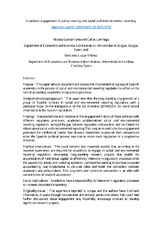Mostrar el registro sencillo del ítem
Academic engagement inpolicy-making and social andenvironmental reporting
| dc.contributor.author | García-Torea, Nicolás | |
| dc.contributor.author | Larrinaga, Carlos | |
| dc.contributor.author | Luque Vílchez, Mercedes | |
| dc.date.accessioned | 2024-01-23T19:20:52Z | |
| dc.date.available | 2024-01-23T19:20:52Z | |
| dc.date.issued | 2019 | |
| dc.identifier.issn | 2040-8021 | |
| dc.identifier.uri | http://hdl.handle.net/10396/26693 | |
| dc.description.abstract | Purpose–This paper aims to document and discuss the involvement of a group of Spanish academics inthe process of social and environmental reporting regulation to reflect on the role of accounting academics inregulatory processes.Design/methodology/approach–The paper describes the long-standing engagement of agroup of Spanish scholars in social and environmental reporting regulation, with a particularfocus on the transposition of theEU Directive 2014/95/EU on non-financial information to theSpanish legislation.Findings–Despite failures and mistakes in the engagement history of those scholars with differentregulatory processes, academics problematized social and environmental reporting regulation, bridged thegap between regulation and practice, and facilitated the debate about social and environmental reporting.This long-term and collective engagement generated the intellectual capital that allowed researchers toprovide their perspectives when the Spanish political process was ripe to move such regulation in aprogressive direction.Practical implications–The paper remarks two important aspects that, according to the reportedexperience, are required for academics to engage in social and environmental reporting regulation:developing long-standing research projects that enable the accumulation of intellectual capital toeffectively intervene in regulatory processes when the opportunity arises; and nurturing epistemiccommunities seeking to promote corporate accountability was fundamental to circulate ideas and fosterthe connection between academics and policymakers.This long-term and collective perspective is at oddswith current forms of research assessment.Social implications–Academics have a responsibility to intervene in regulatory processes to increasecorporate transparency.Originality/value–The experience reported is unique and the authors havefirst-hand information. Itspans through two decades and extracts some conclusions that could feed further discussions aboutengagement and, hopefully, encourage scholars to develop significant research projects. | es_ES |
| dc.format.mimetype | application/pdf | es_ES |
| dc.language.iso | eng | es_ES |
| dc.publisher | Emerald Publishing | es_ES |
| dc.rights | https://creativecommons.org/licenses/by-nc-nd/4.0/ | es_ES |
| dc.source | Garcia-Torea, N., Larrinaga, C. and Luque-Vílchez, M. (2020), "Academic engagement in policy-making and social and environmental reporting", Sustainability Accounting, Management and Policy Journal, Vol. 11 No. 2, pp. 281-290. https://doi.org/10.1108/SAMPJ-03-2019-0123 | es_ES |
| dc.subject | Accounting regulation | es_ES |
| dc.subject | Policy-making | es_ES |
| dc.subject | Academic engagement | es_ES |
| dc.subject | Social and environmental accounting and reporting | es_ES |
| dc.title | Academic engagement inpolicy-making and social andenvironmental reporting | es_ES |
| dc.type | info:eu-repo/semantics/article | es_ES |
| dc.relation.publisherversion | https://doi.org/10.1108/SAMPJ-03-2019-0123 | es_ES |
| dc.rights.accessRights | info:eu-repo/semantics/openAccess | es_ES |

